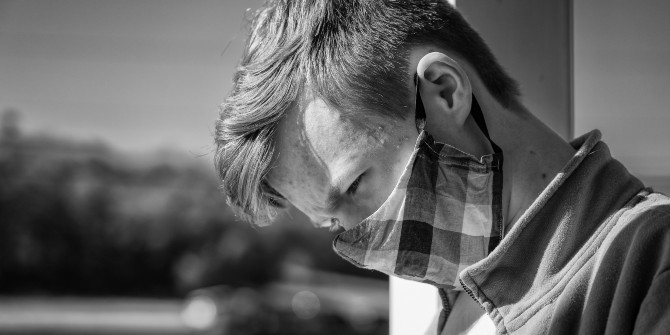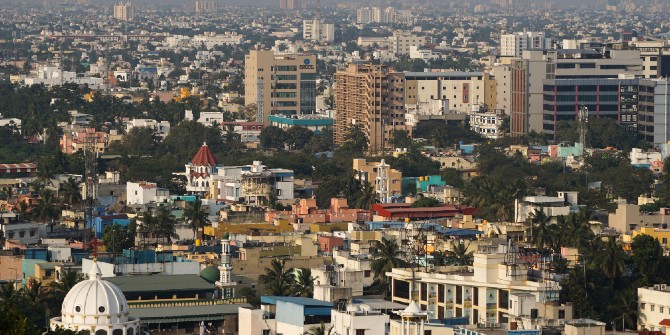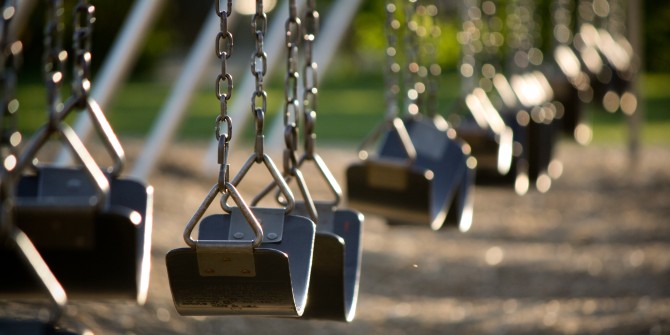Young people, especially those about to start university or get a job, have a gloomy and newly pessimistic outlook on the future. This is not consistent with research from pre-COVID-19 times, which usually finds young people optimistic about their own futures. Drawing on qualitative research with young people before the outbreak and throughout lockdown, Christine Huebner and Dena Arya (Nottingham Trent University) explain where this new pessimism comes from and how it relates to uncertainty, worries, and a perceived loss of agency among young people.
For the past 20 years, young people have consistently been found to be optimistic about the future. This is regardless of whether their prospects were actually better or not. No matter how harsh the economic climate, how bad the labour market conditions, or how high the uncertainty in the face of global terrorism, climate change, or Brexit – the vast majority of young people in Britain always expected at least their own futures to turn out better than those of others.

This optimism has been attributed to ‘an increased emphasis on the importance of agency in determining outcomes’ (Furlong et al., 2018: 96). Young people widely believe in their own abilities to navigate whatever life throws at them and often have the ability to appreciate uncertainty as a window of opportunity. Even though no two young people think the same, in our research we observed this optimism in various shades over and over again.
But COVID-19 seems to have dealt a sudden blow to young people’s belief in their own agency. There are few things that better say ‘You are not in control of the situation’ than a global pandemic and a stay-at-home order. Since the start of the crisis, surveys attest that young people have a newly pessimistic outlook on the future. In the face of uncertainty over what life will be like come autumn, they are anxious and increasingly concerned about their mental health.
We spoke to young people between 15 and 24, many of whom are in transition from school to higher education, from education to the labour market, about their experiences, their hopes and fears since the start of the crisis. They are not representative of young people in Britain by far. But they come from different socio-economic backgrounds, some from independent, others from publicly funded schools, some in higher education, others in work, and yet again others neither in education nor in employment. There is much reason to believe that – in objective terms – they will not equally be affected by the crisis.
Yet the young people we spoke to had one thing in common: they worried about the impact of the crisis on their own futures. About “university and employment prospects” (Sophie, 21), about the impact COVID-19 is going to have “on anyone going into any kind of education this September” (Cas, 18), and generally about “how life will be after lockdown” (Hermiani, 16). They also worried about the effect of the crisis on society more widely, for example on welfare, housing, and environmental policy, as well as about yet another increase in societal polarisation. For a number of them, there were “more worries than hopes at the moment” (Lauren, 19).
• “The things that I am very worried about are university and employment prospects.” Sophie, 21
• “There’s the concern of the economic effect and the future of job security, of getting jobs when I leave university.” Lauren, 18
• “It seems that almost all of next year’s teaching will be online, which I find problematic at best. That’s really the only thing that worries me.” Joseph, 18
• “COVID is going to have a big impact on anyone going into any kind of education this September. University without lectures is a wild impact.” Cas, 18
• “I think a lot of young people are having a really hard time with online learning at the moment.” Anna, 20
• “I am worried about how life will be after lockdown. The coronavirus won’t disappear overnight, so I’m scared that things will never be normal again.” Hermiani, 16
• “I suppose I’m really worried about tenants’ rights and just and green recovery plans.” Emma, 21
• “What worries me at the moment is seeing all the hate and animosity in the media and how vocal people can be on opinions that aren’t nice.” Chantelle, 19
What is more: in our conversations, we found young people who seemed to have lost faith in the power of hard work to overcome these worries – at least momentarily. “The optimism comes and goes. I will admit I’m mostly feeling gloomy and unsure,” says Emma, 21. Some experienced a sudden loss of motivation and said life felt “repetitive”, that they were doing “a lot of nothing” (Cas, 18) and had “a very slow few weeks” (Sophie, 21).
Especially young people in transition – from school to university, from education to the labour market – were experiencing a loss of faith in their own agency. For them, this crisis came at a time when they expected to take control of their own lives. For some it felt as if this opportunity was suddenly taken away from them, Chantelle, 19, for example: “My plan pre-lockdown was to get a job. I had an interview a week before lockdown and I was ready to start – then everything happened. I’d been preparing to move out with my boyfriend and maybe take some small holidays this summer which I was looking forward to.”
In the midst of the crisis, some young people felt as if there was not much choice for them. For Tom, 23, the main question was “What is my next step that I want to take? I have been trying to find a job, but no one has given me a chance.” Joseph, 18, explained how “it’s funny because if I took a gap year I couldn’t travel, and getting a job is hard, too.” And for Cas, 18, the future “is really uncertain. I just have to carry on with the plans I had before because there is no other alternative.”
The good news is that for the majority of young people this perceived loss of agency will be temporary. Many, especially those who are better-off, are hopeful that life will soon return to normal. It is the less privileged young people, those in precarious employment, from less well-off households, or without family support, who will likely be left with a real lack of opportunity for longer. In particular, the most marginalised of young people have been found to hold pessimistic, almost fatalistic views of their own futures way before the coronavirus outbreak – with detrimental effects on their agency and participation choices. For them, the effects of COVID-19 will be worse than for those better off.
The bad news, however, is that we know from research into young people’s participation, including their participation in politics, how even a temporary loss of agency can negatively impact young people’s participation choices and self-efficacy. As the pandemic affects also those who are better-off, even if only mildly, it seems that more young people are getting a taste of what it feels like to lose faith in their own agency.
This post represents the views of the authors and not those of the COVID-19 blog, nor LSE.






Hi,
Colleagues and I are doing research on young people in the North East through the pandemic. We have completed survey of 1000 young people and are now doing follow-up interviews.
It would be great to connect and share findings and ideas about the research agenda.